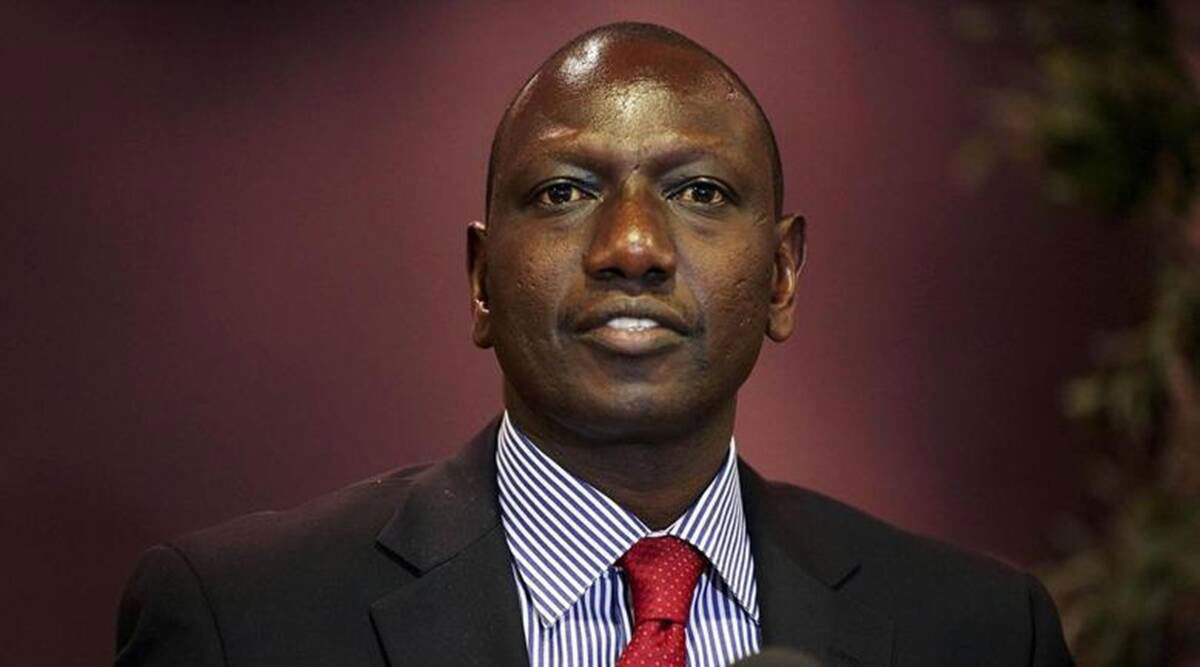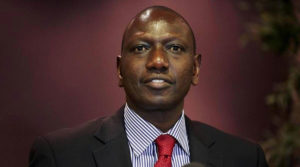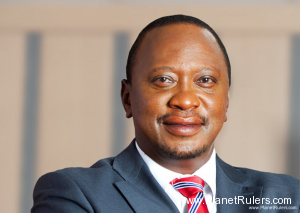



Ruto was elected Member of Parliament for Eldoret North constituency from 1997 to 2007, under the KANU and 2007 to 2013 through ODM party. He was the Minister for Home Affairs in the Daniel Arap Moi administration from August to December 2002. Under the Mwai Kibaki administration, he was the Minister for Agriculture from 2008 to 2010 and Minister for Higher Education from April to October 2010. Ruto ran for the deputy presidency in the 2013 election under the United Republican Party, becoming the running mate of Uhuru Kenyatta from The National Alliance (TNA). Their ticket fetched half the total votes cast, attaining the minimum constitutional threshold for an election winner. He subsequently won the deputy presidency under the Jubilee Party alongside his running mate, Uhuru Kenyatta in the 2017 Kenyan general election. Ruto successfully ran for the presidency in the 2022 election, under the United Democratic Alliance (UDA).
Ruto is married to Rachel Chebet. They were married in 1991 at AIC church. The young couple first lived in Dagoretti where they had their first child.
Ruto owns a considerable chicken farm in his home village of Sugoi, which was originally inspired by his stint as a live chicken hawker on the Nairobi-Eldoret-Malaba highway.Ruto and his wife build a chapel in their compound at their residence in the Karen suburb of Nairobi.
Source: https://en.wikipedia.org/wiki/William_Ruto


Update Aug 8, 2017: In presidential elections, incumbent Uhuru Kenyatta wins 54.3% of the vote.
Uhuru Muigai Kenyatta (born 26 October 1961) is the fourth and current President of Kenya, in office since 9 April 2013. He previously served in the Government of Kenya as Minister of Local Government from 2001 to 2002, and he was Leader of the Official Opposition from 2002 to 2007; subsequently he was Deputy Prime Minister from 2008 to 2013. He served as the Member of Parliament for Gatundu South Constituency beginning in 2002. Kenyatta was also Chairman of Kenya African National Union (KANU), which was a part of the Party of National Unity (PNU).
Full bio: http://en.wikipedia.org/wiki/Uhuru_Kenyatta
President Mwai Kibaki was born on November 15th, 1931 in Gatuyaini Village, Othaya division, Nyeri, in the Central Province. He is the last-born son of the late Kibaki Githinji and the late Teresia Wanjiku. His siblings include Philip Githinji, Kinyua Kibaki, Anastasia wangui, Waruguru Kibaki (who are all deceased now), Ester waitherero, Bernard Nderitu and a half-brother Samuel Githinji.
Mwai Kibaki went to Gatuyaini village school where he completed what was then called Sub “A” and sub “B” which is the equivalent of standard one and two. He then joined Karima mission school for the three more classes of primary school. He later moved to Mathari School (now Nyeri High School) between 1944 and 1946 for Standard four to six. Here, he learnt carpentry and masonry because students would repair furniture and provide material for maintaining the school’s buildings. He also grew his own food as all students in the school were expected to do.
Kibaki extended the art of self-reliance to his school holidays where he earned extra money by working as a turn boy on buses operated by the defunct Othaya African Bus Union.
After Karima Primary and Nyeri Boarding primary schools, he proceeded to Man’gu High School where he studied between 1947 and 1950. He passed with a maximum of six points in his “O” level examination. He was influenced by the veterans of the two World Wars in his village and once considered becoming a soldier in his final year in Man’gu. This did not materialize because of a ruling by the Chief colonial secretary, Walter Coutts, which barred the recruitment of the Kikuyu, Embu and Meru communities into the army.
After Man’gu he proceeded to Makerere University to pursue a Bachelor of Arts degree in Economics, History and Political Science. While at the University, Kibaki was the Chairman of the Kenya Students Association and the Vice-Chairman of Makerere Students Guild.
He graduated in 1955 with a First Class Honours Degree (BA) in Economics and took up an appointment as Assistant Sales Manager Shell Company of East Africa, Uganda Division. It is during the same year that he earned a scholarship to do postgraduate work in any British University. He enrolled at the prestigious London School of economics for a B.sc in public finance, graduating with a distinction.
He went back to Makerere in 1958 where he taught as an Assistant Lecturer in the economics department until 1960. In December 1960, he quit Makerere and returned home to take up a job with Kanu as an Executive Officer. Earlier in March 1960,he had been involved in the founding of the KANU party.
In 1962, Kibaki married Lucy Muthoni, the daughter of a Church Minister, and together they have four children: Judy Wanjiku, Jimmy Kibaki, David Kagai, and Tony Githinji. They also have three grandchildren: Joy Jamie Marie: Mwai Junior and Krystina Muthoni.
In 1963 he made a debut in elective politics by contesting the Donholm Constituency (now Makadara) in Nairobi Province, which he won on a Kanu ticket.
He was made the parliamentary secretary to the Minister of Finance from 1963 to 1965 and in 1965 he was appointed a minister at the Ministry of Commerce and Industry where he served until 1969.In the same year, Mwai Kibaki was re-elected the MP for Donholm Constituency on a Kanu ticket.
He was later moved to the strategic ministry of Finance and economic Planning where he served from1970 to 1978. During this period Kibaki, moved his political base from Nairobi to Othaya and was re-elected in 1974 to represent Othaya constituency on a Kanu ticket. He was re-elected MP for the same constituency in the subsequent elections of 1979, 1983 and 1988. Besides being MP, Kibaki was the Othaya Kanu branch chairman from 1974 to 1991 when he resigned from Kanu to found the Democratic Party (DP).
Kibaki was appointed Vice-President in 1978 when Daniel Arap Moi took over the reins of power following the death of founding President, Jomo Kenyatta. He continued to serve in the Ministry of Finance and Economic Planning until 1983 when he moved to the Ministry of Home Affairs and National Heritage .He served until 1988 when he was again moved to the Ministry of Health. Kibaki was also the Leader of Government Business and Chairman of the Sessional Committee from 1978 to 1988.He was the Kanu vice-President from 1978 to 1988.
Kibaki founded DP on December 25th, 1991 and vied for the Presidency on its ticket in the 1992 elections.He came third after Daniel Moi and Kenneth Matiba.
In 1997 he contested for the Presidency again on the same ticket and came second to Kanu’s Daniel Arap Moi.He became Member and Chairman of Public Accounts Committee from 1997 to 2002.
In January 1998 DP became the Official Opposition Party hence Kibaki assumed status of the Leader of the Official Opposition Party. He also became a Member of the House Business Committee from 1998 to 2002.
Mwai Kibaki was sworn in as President on 30th December 2002 after winning in the preceding General Elections held on 27th December 2002. He is Kenya’s 3rd President.
Rishi Sunak, Prime Minister of the United Kingdom (since Oct 25, 2022) Rishi Sunak (born…
Giorgia Meloni, Prime Minister of Italy (since Oct 22, 2022) Giorgia Meloni (born 15 January…
Mahamat Déby, President of Chad (since Oct 10, 2022) Mahamat Idriss Déby Itno (born 1…
João Lourenço, President of Angola (sworn in on Sept 26, 2017) Sworn in for his…
Gustavo Petro, President of Colombia (since Aug 7, 2022) Gustavo Francisco Petro Urrego ODB ODSC…
Bajram Begaj, President of Albania (since Jul 24, 2022) Bajram Begaj (born 20 March 1967)…
This website uses cookies.